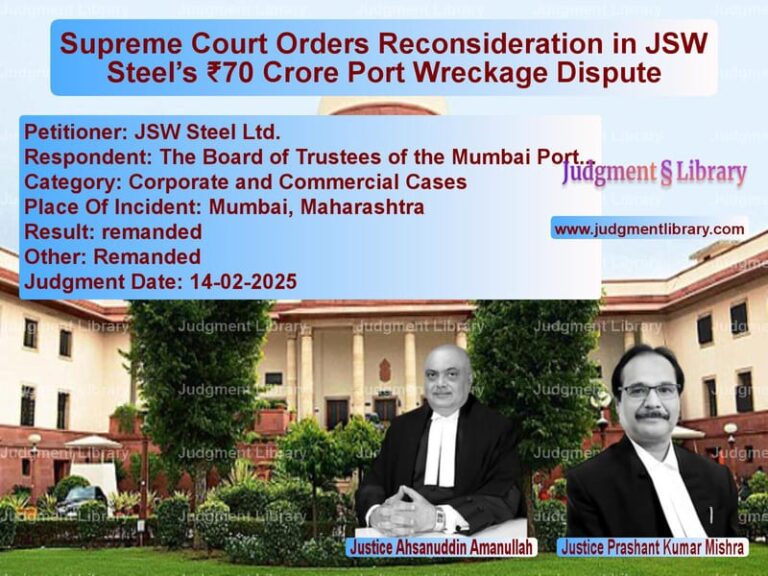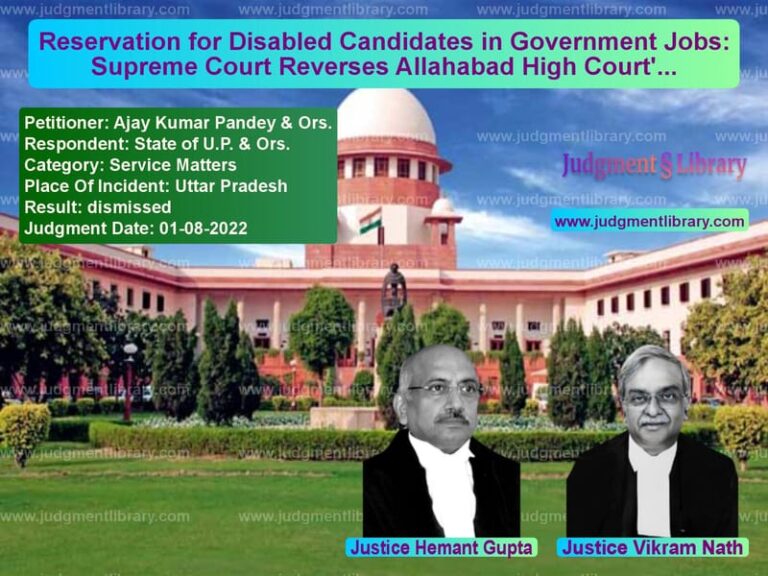Supreme Court Rules Against Unlawful Demolition: Upholds Due Process in Property Rights
The case of In Re Manoj Tibrewal Akash vs. State of Uttar Pradesh is a landmark ruling that addresses the issue of unlawful demolition of private property by state authorities. The Supreme Court of India, in its judgment dated November 6, 2024, held that the demolition of the petitioner’s ancestral home was illegal and violative of constitutional rights. The Court directed punitive compensation, disciplinary action against responsible officers, and laid down guidelines to prevent future arbitrary demolitions.
Background of the Case
This case arose when senior journalist Manoj Tibrewal Akash petitioned the Supreme Court, alleging that the Uttar Pradesh state authorities unlawfully demolished his ancestral residential house and shop, located in District Maharajganj. The demolition was carried out purportedly as part of a road-widening project for National Highway 730.
Key Legal Issues
- Whether the demolition was carried out in accordance with due process of law.
- Whether the state had the authority to demolish private property without issuing a prior notice.
- Whether the petitioner’s fundamental rights under Article 300A (right to property) were violated.
- What reliefs should be granted to the petitioner for the unlawful demolition.
Petitioner’s Arguments
The learned counsel for the petitioner presented the following arguments:
- The demolition was carried out without prior written notice, violating due process of law.
- The state authorities did not provide any official records justifying the demolition.
- The petitioner’s family had legally owned the property since 1964, and it was unlawfully destroyed.
- The demolition was a retaliatory act, as the petitioner had earlier exposed alleged corruption in the road-widening project.
- The National Human Rights Commission (NHRC) report confirmed that the demolition exceeded the extent of the alleged encroachment.
Respondent’s Arguments
The State of Uttar Pradesh, represented by its counsel, defended the demolition with the following arguments:
- The property in question was allegedly encroaching upon government land earmarked for the highway expansion.
- The state had made public announcements (Munadi) to inform occupants about the need to vacate.
- The petitioner’s family had been given sufficient time to remove their belongings.
- The state was merely executing its duty in implementing an infrastructure project.
- The government had separately conducted an inquiry and was willing to consider compensation if any excess demolition occurred.
Supreme Court’s Observations
The Supreme Court examined the legal and factual aspects of the case and made the following key observations:
1. Violation of Due Process
The Court found that no written notice was issued before the demolition, which is a fundamental requirement of due process. The only notification was through loudspeakers, which the Court deemed inadequate.
2. Lack of Official Documentation
The state failed to produce any official records showing the precise width of the national highway or whether the petitioner’s property was indeed encroaching upon government land.
3. Excessive Demolition
The NHRC’s investigation revealed that the demolition exceeded the alleged encroachment area. The property was demolished far beyond the necessary extent, indicating an abuse of power.
4. Right to Property Under Article 300A
The Court reiterated that the right to property, while not a fundamental right, is protected under Article 300A of the Constitution. The state cannot deprive citizens of their property without following due process.
5. Potential Retaliation Against the Petitioner
The Court noted the petitioner’s claim that the demolition was an act of reprisal for his journalistic work exposing corruption in the road project. While it did not make a conclusive finding on this aspect, the Court emphasized that state actions must be free from political or personal vendettas.
Final Judgment
The Supreme Court ruled in favor of the petitioner and issued the following directives:
- Punitive Compensation: The state was ordered to pay Rs. 25 lakh as interim compensation to the petitioner.
- Disciplinary Action: The Chief Secretary of Uttar Pradesh was directed to conduct an inquiry against all officers involved in the illegal demolition.
- Criminal Proceedings: The state was ordered to register an FIR against the officials responsible for the demolition and investigate the matter through the Crime Branch-CID.
- National Guidelines: The Court laid down procedural safeguards for road-widening projects, requiring proper surveys, written notices, and an opportunity for affected persons to be heard before demolitions.
- Future Review: The Registrar (Judicial) was instructed to circulate this judgment to all states and union territories to ensure compliance.
Impact of the Judgment
This ruling sets a strong precedent against arbitrary demolitions by state authorities. It ensures that:
- Citizens’ property rights are safeguarded under the Constitution.
- State officials are held accountable for unlawful demolitions.
- Road-widening and infrastructure projects follow legal procedures to prevent injustice.
- The use of bulldozer justice is condemned as a violation of fundamental rights.
By enforcing due process, this judgment strengthens the rule of law and prevents state excesses in property-related matters.
Petitioner Name: Manoj Tibrewal Akash.Respondent Name: State of Uttar Pradesh.Judgment By: Justice Dhananjaya Y. Chandrachud, Justice J.B. Pardiwala, Justice Manoj Misra.Place Of Incident: Maharajganj, Uttar Pradesh.Judgment Date: 05-11-2024.
Don’t miss out on the full details! Download the complete judgment in PDF format below and gain valuable insights instantly!
Download Judgment: manoj-tibrewal-akash-vs-state-of-uttar-prade-supreme-court-of-india-judgment-dated-05-11-2024.pdf
Directly Download Judgment: Directly download this Judgment
See all petitions in Property Disputes
See all petitions in Damages and Compensation
See all petitions in Fundamental Rights
See all petitions in Judgment by Dhananjaya Y Chandrachud
See all petitions in Judgment by J.B. Pardiwala
See all petitions in Judgment by Manoj Misra
See all petitions in allowed
See all petitions in Quashed
See all petitions in supreme court of India judgments November 2024
See all petitions in 2024 judgments
See all posts in Civil Cases Category
See all allowed petitions in Civil Cases Category
See all Dismissed petitions in Civil Cases Category
See all partially allowed petitions in Civil Cases Category






